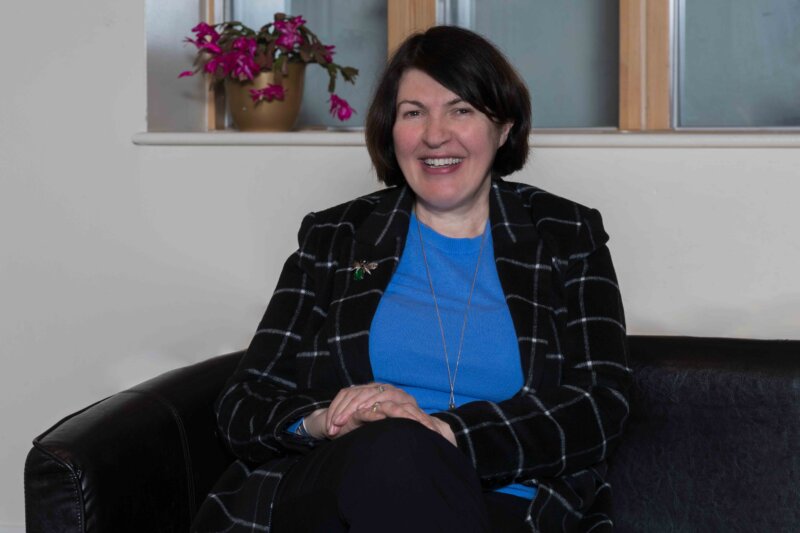As creator of the UK’s leading and award winning childcare social enterprise, June O’Sullivan OBE continues to break new ground in the development of LEYF’s scalable social business model. A tireless campaigner, disrupter and commentator looking for new ways to influence policy and make society a better place for all children and families, June continues to advise the Department for Education as well as key organisations such as Ofsted, The Royal Foundation Centre for Early Childhood, The Mayor’s London’s Child Obesity Taskforce as well as consulting with academics and services (both in the UK and overseas) about how best to implement a social enterprise vision for the Early Years.
Can you tell us a little about your background and the company?
I am Chief Executive of the London Early Years Foundation (LEYF), which I created in 2006 from a small local charity. This is now one of the UK’s largest and most successful charitable social enterprises and has become a successful model of childcare for all children.
LEYF emerged form a small group of grant dependent nurseries based in Westminster. Now, we are the first large group of social enterprise nurseries in the UK, operating 39 nurseries for over 4,500 children, with a specific focus on supporting disadvantaged children in the most deprived areas.
LEYF’s nursery offering is supported by the London Institute of Early Years which I created, and this provides high-quality continued professional development (CPD) and training to all those across the Early Years community.
As extensive research shows, the Early Years are a critical time for children’s learning and development and profoundly shape their future life outcomes. Investment at this stage results in significant savings in later interventions. However, not all young children in the UK are being given this opportunity, especially those from disadvantaged backgrounds, many of whom are being left behind by the Early Years system. I believe that with the right structure, pedagogy, staff engagement and community partnerships, nurseries can deliver best-in-class service to all children.
How did the idea come to you for the company?
I wanted to make sure every child could access a place no matter what their background and I did not believe I could do this if I was reliant on grants and traditional fundraising. I wanted to build a sustainable business model which could be grown and replicated and have control of our own destiny. I want every child, no matter what their background, to have access to the best nursery and a business with a strong social purpose right through its core.
How have you been able to gain funding and grow?
Under my leadership, LEYF became a social enterprise in 2008 designing a cross-subsidy fee system so we could subsidise one third of our places for children from poor and disadvantaged families. We track our social impact via the LEYF Steering Wheel that captures number of funded hours plus progress on sustainability and working with communities.
Our growth has been accelerated via capital investment, external financing as well as philanthropic/government grant funding.
LEYF has also become one of eight education NGOs (selected from more than 4,000) to benefit from the Greater Share Education Fund. This is a new philanthropic investment model that harnesses the expertise of the world’s top performing private equity funds and highest impact NGOs to transform education for children in under-served communities across the world. LEYF will now be using the funds to replicate its model across the world.
What are the key successes?
I designed the LEYF Pedagogy for Social Justice which makes use of evidence that identifies best practice to ensure children from disadvantaged backgrounds can really thrive by accessing the right balance of learning and development. It enhances language, strengthens cultural capital, and ensures children exceed developmental expectations irrespective of their background or learning need.
Other successes include;
- Setting up UK’s first ever Early Years Chef Academyto provide training for all chefs responsible for cooking and serving nursery food
- Developing the first LEYF Early Years degree programme in partnership with the University of Wolverhampton
- Encouraging more men to join the sector by championing the positive roles men can play in the crucial first years of a child’s education
- First Early Years organisation to demonstrate its sustainability credentials through ISO14001and create a specific Diploma for Sustainability in the Early Years
What were/are the challenges and how have you overcome these?
I’ve successfully navigated LEYF through economic downturns and COVID and it continues to thrive while so many other social businesses have been less successful. I’ve also demonstrated how Early Years is part of the national infrastructure both in terms of enabling parents to work, employing over 900 staff including up to 100 apprentices and providing high quality education. True to our values, we remained very focused on quality delivered through our Pedagogy, People and Practice.
Other challenges have been the Government’s reluctance to give the Early Years sector the recognition it truly deserves including proper funding so that we can train and retain staff and pay them a decent living wage. Recent figures from the Recruitment & Employment Confederation (REC) and Lightcast Labour Market Tracker reveal there’s been a whopping 146.2% increase in job postings for Early Education and Childcare Practitioners. The recruitment of talented Early Years staff is critical in helping meet the increase in demand for childcare as part of the Government’s ‘free childcare’ expansion plan.
What are your plans now/for the future?
My ambition is to provide ~10,000 children with access to high quality and affordable Early Childhood Education and Care (ECEC), targeting support for the most disadvantaged children in London, whilst continually enriching the experiences of each child through innovative services and initiatives. We will use our unique replicable model to act as a catalyst for driving sustainable, systemic change in Early Years.
What would you like to share with others to encourage them to start their own entrepreneurship journey?
Can you share your top tips for entrepreneurial success?
- Follow your gut instincts
- Get a team who is seriously knowledgeable about their subject, so they can try things knowing the basics are solidly anchored
- Dial up your emotional intelligence
- Connect with people who your trust and create your own network
Who are the 5 people who inspire you the most and why?
Jenny Holloway – CEO Fashion Enter: Focus and determination and trying to change the fashion industry.
Mark Simms – CEO P3: Kind, knowledgeable and gives me confidence when things are tough.
Ken Loach – Film maker: Digs straight into issues of poverty and discomfort in a creative clever way.
Mary Robinson – Ireland’s first female president. She has a firm stance on child poverty, acknowledging how it can threaten children’s very survival, or cause permanent damage whilst destroying opportunities of fulfilment forever.
Professor Christine Pascal: For setting up the EECERA annual conference which brings practitioners and academics together to share our learning and raise the quality of nursery education for all children.
What are your favourite inspirational /motivational quotes?
Leadingchildren’s organisations with a social purpose is not just a job – it’s a commitment to changing the world one child at a time. June!
You make a living by what you get. You make a life by what you give.” Winston Churchill
“The world is reaching the tipping point beyond which climate change may become irreversible. If this happens, we risk denying present and future generations the right to a healthy and sustainable planet – the whole of humanity stands to lose.”
Kofi Annan, Former Secretary-General of UN
“Children are great imitators. So, give them something great to imitate.” — Anonymous
What are your Instagram, Facebook and LinkedIn social handles and also website links so our readers can connect with you?
@JuneOSullivan
https://www.linkedin.com/in/june-osullivan/?originalSubdomain=uk
Website
- lisafoundersitehttps://thesuccessfulfounder.com/author/lisafoundersite/
- lisafoundersitehttps://thesuccessfulfounder.com/author/lisafoundersite/
- lisafoundersitehttps://thesuccessfulfounder.com/author/lisafoundersite/
- lisafoundersitehttps://thesuccessfulfounder.com/author/lisafoundersite/






